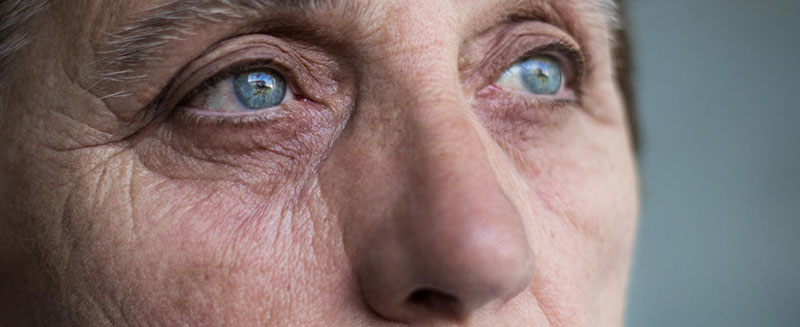
Alzheimer’s disease can cause vision issues that affect a senior’s behavior and safety.
The elaborate, complicated steps associated with making it possible for us to see are amazing. In the blink of an eye, our brains can easily take data transmitted from our environment, interpret that data in accordance with feedback from our other thoughts, senses, and experiences and then acquire an understanding of that information which will make us conscious of what it is we’re seeing.
It is understandable then that dementia can create vision issues, causing misconceptions and visual deficits, especially in the areas of:
- Depth perception
- Color perception
- Contrast
- Movement recognition
- Peripheral sight
As though that weren’t challenging enough, older adults with dementia may experience an altered sense of the world in the form of delusions. To illustrate, imagine a person with Alzheimer’s disease or some other type of dementia sees a shadow on the wall. The elderly individual might mistake it for something benign, such as the family’s pet cat, or a danger, like a burglar. Other kinds of visual misconceptions in dementia can include:
- Misinterpreting their own reflections in a mirror or window for another person. This might lead the senior to think someone else is there, and in the case of a bathroom mirror, may lead the senior to refrain from going in when needed, causing pain and distress.
- Thinking that images on the television are real and going on in the room.
- Issues with sitting in a chair or on the commode, fearing they will fall.
- Feeling stressed in overstimulating surroundings that induce confusion.
- Reaching out for things that are not there, or missing the mark in attempting to pick up something.
- Problems with eating and drinking.
Try these ideas to help a senior with dementia who is challenged by eyesight changes:
- Ensure adequate lighting in the home, and remove any items that are creating stress or visual confusion, if possible.
- Utilize contrasting colors. For instance, serve a light-colored cream soup in a dark bowl.
- Close all shades or drapes at nighttime and whenever the sunlight causes a glare.
- Use adaptive equipment like remote controls and telephones with bigger buttons to help empower the senior to maintain independence in spite of visual obstacles.
At Hearts at Home In-Home Care, a provider of respite care in Overland Park, KS and the surrounding areas, we’re committed to ensuring that the older adults in our care are always safe and thriving. Our highly trained dementia care specialists understand the visual issues and other changes that develop, and are equipped with innovative, compassionate ways to help.
For more information on our in-home dementia care services, or if you want to request additional resources linked to caring for a senior at home, call us any time at 913-440-4209.
